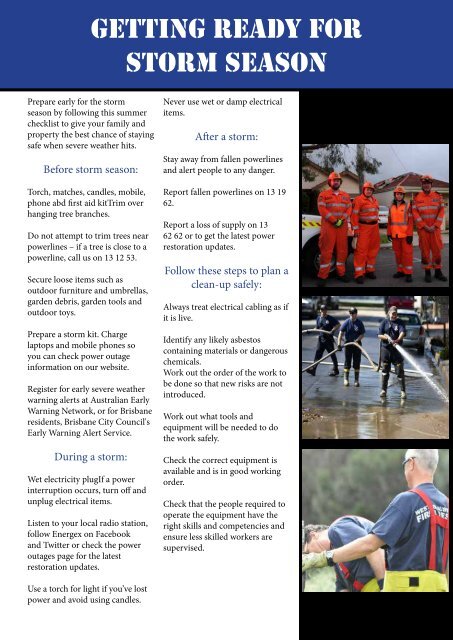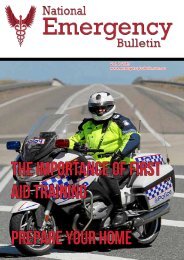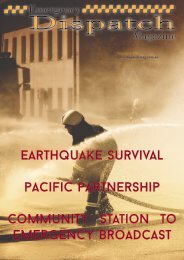National Emergency Magazine Vol. 4 2014
Create successful ePaper yourself
Turn your PDF publications into a flip-book with our unique Google optimized e-Paper software.
Getting ready for<br />
storm season<br />
Prepare early for the storm<br />
season by following this summer<br />
checklist to give your family and<br />
property the best chance of staying<br />
safe when severe weather hits.<br />
Before storm season:<br />
Torch, matches, candles, mobile,<br />
phone abd first aid kitTrim over<br />
hanging tree branches.<br />
Do not attempt to trim trees near<br />
powerlines – if a tree is close to a<br />
powerline, call us on 13 12 53.<br />
Secure loose items such as<br />
outdoor furniture and umbrellas,<br />
garden debris, garden tools and<br />
outdoor toys.<br />
Prepare a storm kit. Charge<br />
laptops and mobile phones so<br />
you can check power outage<br />
information on our website.<br />
Register for early severe weather<br />
warning alerts at Australian Early<br />
Warning Network, or for Brisbane<br />
residents, Brisbane City Council's<br />
Early Warning Alert Service.<br />
During a storm:<br />
Wet electricity plugIf a power<br />
interruption occurs, turn off and<br />
unplug electrical items.<br />
Listen to your local radio station,<br />
follow Energex on Facebook<br />
and Twitter or check the power<br />
outages page for the latest<br />
restoration updates.<br />
Never use wet or damp electrical<br />
items.<br />
After a storm:<br />
Stay away from fallen powerlines<br />
and alert people to any danger.<br />
Report fallen powerlines on 13 19<br />
62.<br />
Report a loss of supply on 13<br />
62 62 or to get the latest power<br />
restoration updates.<br />
Follow these steps to plan a<br />
clean-up safely:<br />
Always treat electrical cabling as if<br />
it is live.<br />
Identify any likely asbestos<br />
containing materials or dangerous<br />
chemicals.<br />
Work out the order of the work to<br />
be done so that new risks are not<br />
introduced.<br />
Work out what tools and<br />
equipment will be needed to do<br />
the work safely.<br />
Check the correct equipment is<br />
available and is in good working<br />
order.<br />
Check that the people required to<br />
operate the equipment have the<br />
right skills and competencies and<br />
ensure less skilled workers are<br />
supervised.<br />
Use a torch for light if you’ve lost<br />
power and avoid using candles.





